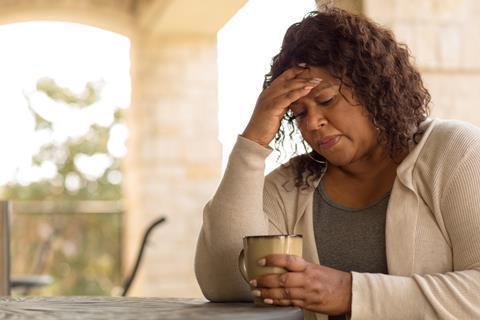Research from Menopause Experts Group highlights a rise in suicide rates for women aged 45 to 54 – the age when most women experience perimenopause and menopause. Dr Kate Middleton explains why and offers practical coping strategies

Suicidal feelings arise in moments when things in our lives have pushed us into an emotional space beyond our capacity to cope. Think of your emotional ‘tank’ as having a 0-10 scale. Once the level rises to about 8, your brain triggers emergency measures. Your ability to analyse dramatically reduces, meaning you’re more likely to make impulsive, in-the-moment decisions. At the same time, you will start to experience a powerful urge to do something to change the situation and escape from whatever it is that has become so demanding.
Another really important factor when it comes to suicidal thoughts is the inner need we have to believe we are in control and can manage the important things in life. This part of our core identity is challenged in times of significant change or when things haven’t gone the way we’d hoped, especially if we’ve experienced trauma or loss.
When overwhelming emotional load and stress combines with a sense of panic and hopelessness, suicidal thoughts can be triggered. Think of them like a warning light on the dashboard of the car. They’re a sign that you are not able to think clearly; that you need some space, rest and help. They are nothing to be ashamed of, but they do need to be taken seriously.
Questioning who we are
So what does this have to do with menopause? Well, this is a time of significant change for all women, but some find it very difficult physically, with symptoms such as insomnia, pain or exacerbations of other medical conditions. Aside from being difficult in themselves, these cause a rise in our physiological stress levels, operating on the same system as emotions such as anxiety, anger and frustration. This water is pouring into the same tank, pushing us closer to that emergency limit.
They also add to the sense that everything is changing; that unsettling sense of losing balance and sense of identity, which can trigger difficult emotions. In menopause we question who we are, and this often coincides with other stressful changes: children growing up and leaving home; elderly parents becoming unwell; carrying significant responsibility in work roles. This extra emotional challenge can lead to problems if we’re particularly vulnerable or if life was already tough.
How can we do manage these challenges more effectively?
Talk. Our instinct is to hide, but isolation adds to feelings of despair and can allow anxieties and panic to fester. Create safe spaces to share with people who can be trusted, and who will be caring and supportive.
Seek expert help. Menopause doesn’t have to be a nightmare, even if your symptoms have suddenly flared. Go to your GP to discuss treatment options. You might also find this recent Woman Alive article helpful.
Get out more. Fresh air helps to lift mood; exposure to daylight is great for our natural sleep-wake cycle, which can help with insomnia; time in nature changes our perspective and makes us feel so much better; and just getting away from the challenges of the everyday brings much-needed headspace. If you can walk, run or cycle for at least 30 mins, hard enough to raise a slight sweat and be a bit out of breath, you’ll trigger endorphins, which help balance stress, improve mood and help you feel more at peace.
Be more mindful. According to Mindfulness expert Belinda Norrington, research suggests mindfulness is helpful “not so much for eliminating physiological symptoms, but for managing the exacerbating distress and anxiety that those symptoms can understandably cause for some individuals”. This, she says, is “very positive news, as mindfulness is a non-invasive, non-medicine-based approach, and can bring a very welcome sense of agency, self-compassion and emotional regulation at a time full of transition and change”.
Stay strong. Pilates instructor Caroline Stephens teaches her clients about the value of strength, balance and flexibility as they transition through menopause: “Oestrogen is an amazing hormone and does so much for us. That’s why, as it drops, we need to be intentional about how to fill the gaps. Focus on functional strength. What do we need to do for everyday life? Lift, carry, push, crouch, kneel, get up out of a chair…Something as simple as balancing on one leg for one minute has a host of benefits, but joining a class or group can help overcome isolation and help you build up your strength.”
Taking small steps is beneficial in itself because it raises that sense of control and challenges hopelessness and despair. So even if all you can do is something small, do it. It may help you feel more able to plan your next, bigger step.
Click here for more information about managing suicidal thoughts and here for advice on insomnia. Belinda Norrington offers faith-based mindfulness sessions to help people find peace and stillness amid the challenges of their situation, including a free online Zoom session from 7 to 7:20pm (contact her for details). Caroline Stephens offers regular online Pilates classes for varying abilities and ages.

I’m a mental health specialist and a mental illness diagnosis shouldn’t define us - only God can do that
I’m a Christian and a doctor and this is how your periods affect your mental health, plus how to manage it the godly way
The three things we need to teach our children - and ourselves - about eating, when the world says restricting our food is good































